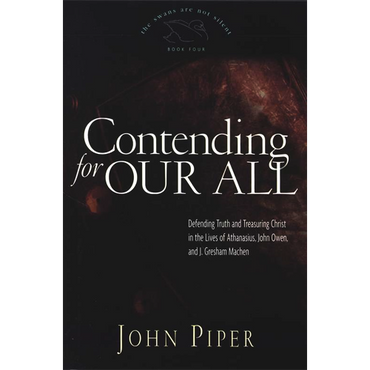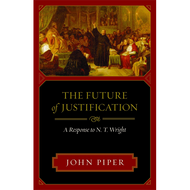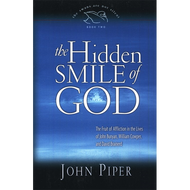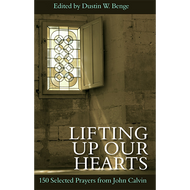Categories
Categories
Contending for Our All by John Piper (Hardcover)
Product Description
Publisher's Description
Athanasius, John Owen, and J. Gresham Machen stood for the truth of God’s Word in the face of opposition—all out of a deep love for Christ and a desire for others to know God in his fullness. These men were willing to suffer for the sake of guarding the sanctity of the gospel. They faced many threats, years of exile, the deaths of loved ones, opposition from friends and authorities, and sickness and pain. Yet they passionately maintained their zeal for Christ himself and steadfastly defended the gospel. In this fourth book of The Swans Are Not Silent series, John Piper delivers concise biographies of these great men. He shows how a bishop, pastor, and seminary founder each emulated personal holiness, despite adversity and affliction. Readers will be encouraged and emboldened from the stories of these soldiers who defended truth for the sake of the cross. Now available in paperback.
About the Author
John Piper (DTheol, University of Munich) is the founder and teacher of desiringGod.org and the chancellor of Bethlehem College & Seminary. He served for 33 years as the senior pastor of Bethlehem Baptist Church in Minneapolis, Minnesota, and is the author of more than 50 books, including Desiring God, Don’t Waste Your Life, This Momentary Marriage, Bloodlines, and Does God Desire All to Be Saved?
Endorsement
This is the fourth book in Piper's series, "The Swans Are Not Silent," and follows his pattern of looking at three "swans" of church history through the lens of a central theme. The three presented here are Athanasius, John Owen, and J. Gresham Machen; the theme is the subtitle, Defending Truth and Treasuring Christ.
I was immediately captivated by Piper's Introduction, so much so, that I read portions of it aloud to several people, prefaced by an excited "Listen to this!" His discussion of truth, controversy, and humility sets the tone for what is to come. Piper lays out the historical background for his treatment of Athanasius by discussing the nature of orthodox theology in the fourth century, particularly with regard to the doctrine of the Trinity and the heresy of Arianism. In the second half of this first chapter, he gives seven practical lessons we can learn from the life of Athanasius, and shows that old battles are still being fought, but with new terminology.
John Owen is the only "swan" I had read previously. Piper begins his discussion of Owen by relating the impact Owen has had on men like J.I. Packer, Sinclair Ferguson, and on Piper himself. He gives a brief biography of Owen, including a short definition of Puritanism. He sees the heart of Owen's life and ministry as the mortification of sin and personal holiness: "Be killing sin or it will be killing you." I particularly loved Piper's comment about the relationship between private spirituality and public ministry:
One great hindrance to holiness in the ministry of the Word is that we are prone to preach and write without pressing into the things we say and making them real to our own souls. Over the years words begin to come easy, and we find we can speak of mysteries without standing in awe; we can speak of purity without feeling pure; we can speak of zeal without spiritual passion; we can speak of God's holiness without trembling; we can speak of sin without sorrow; we can speak of heaven without eagerness. And the result is an increasing hardening of the spiritual life. (p. 109)
Piper's final chapter is about J. Gresham Machen and his valiant battle against the Modernism of the early 20th century. After saying that it is not much different from the postmodernism of our day, Piper lists twelve lessons from Machen's life and work applicable to today, and is not shy about bringing up his flaws. In fact, the final section of the chapter is titled "Hope in God's Sovereignty Through Human Shortcomings," an encouragement to us all.
The Conclusion is a gem. With a brief nod to another "sweet-singing twentieth-century swan," Francis Schaeffer, Piper reminds us that passionately standing for the truth is inextricably linked to love. He discusses several Scripture passages where this is taught. He then closes the book with "Our Prayer In a Time of Controversy." This brief prayer, combined with the Introduction and Conclusion, are, in my mind, reason enough to read Contending For Our All. This is not just a history lesson, but also a book for your spiritual benefit.
 Loading... Please wait...
Loading... Please wait... 









